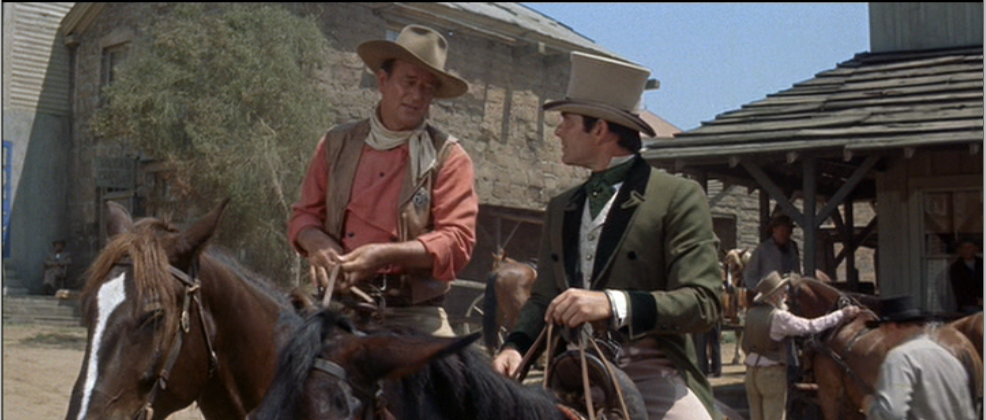Movie Review: The Comancheros (1961) directed by Michael Curtiz
In 1843, gambler and womanizer Paul Regret (Stuart Whitman) kills a man in an illegal duel in Louisiana. This ordinarily wouldn’t be a problem, except that the dead man (who’d falsely accused him of cheating at cards to eliminate him as a romantic rival) had a politically powerful father. Paul decamps to the Republic of Texas, an entirely separate country at the time. On a steamboat to Galveston, Paul meets an attractive but mysterious woman named Pilar (Ina Balin) and it’s clear they have a strong connection.

Alas, Paul was unaware that Texas now has an extradition treaty with Louisiana. He’s arrested by Texas Ranger Captain Jake Cutter (John Wayne). On the way to Ranger headquarters, the lawman and prisoner run across a farm where all the inhabitants were slaughtered by Comanches. Monsieur Regret (Captain Cutter always pronounces it “Mon-Sewer”) takes advantage of Jake’s distraction to escape.
Back at HQ, Captain Cutter is embarrassed, but gets a new assignment. It seems a gunrunner named Ed McBain has been captured, and has just enough information on a mysterious group called the “Comancheros” to be worth investigating. Jake will go undercover as McBain to deliver the rifles (sans firing pins) and get the goods on the Comancheros.
In Sweetwater, Jake meets up with Tully Crow (Lee Marvin), agent of the Comancheros. Crow is a colorful character who’s been partially scalped, and is such a loose cannon that prostitutes bail out the moment they see him. A rowdy night on the town ends with Jake having to shoot Crow, but he manages to re-arrest Paul in the process. The two men are beginning to respect each other just a bit, and when Regret risks his own life and freedom to aid the Rangers during a Comanche attack, Captain Cutter gets a local judge to help out–at the cost of Paul having to join the Rangers.
Jake and Paul then continue the undercover mission and find themselves in the hidden valley of the Comancheros, a villainous society that provides the Comanches with weapons and booze in exchange for the spoils of their raids. But can our heroes get back out?
This 1961 film was based on a novel of the same name by Paul Wellman, with the Jake Cutter part expanded as John Wayne was the bigger star. Mr. Wayne also directed some of the scenes, as Michael Curtiz was terminally ill during the production and sometimes could not work.
Good: This is a fun Western that doesn’t take itself too seriously. The performances by the main characters (and a couple of the minor ones) are excellent. There’s plenty of exciting action and the music is good (other than an excruciating performance of “Little Red Wing” by Lee Marvin and John Wayne who are supposed to be drunk at the time.) There’s some room for shades of grey.
The lead villain, Graile (Nehemiah Persoff), father of Pilar, cannot walk and gets around in a wheelchair. He’s not evil or bitter because of his disability (he was a baddie from the start), and although it causes him realistic difficulties, he’s not treated as lesser by the script or the characters.
Less Good: The Comanche are depicted as alcohol-crazed barbarians, with the alcoholism played for laughs. They are easily manipulated by the Comancheros. (I cannot speak to accuracy of costuming, but considering most of the guns are wrong for the time period, I am not optimistic.)
In keeping with having the Texas Rangers be absolutely the heroes of the story, no mention at all is made of slavery, even when discussing Texas’ war of independence from Mexico, and no black people appear on screen in Louisiana or Texas.
Pilar is awfully quick to decide she doesn’t want to carry on the family business based on her affection for a man she’s known for maybe four days total.
Content note: standard Western movie violence (but bloodless), torture.
Overall: Definitely in the upper quarter of John Wayne movies, so if you like him as an actor, this is well worth seeing. The depiction of Native Americans is likely to be grating to modern audiences though, and parents of younger viewers might want to discuss outdated attitudes in older movies.

